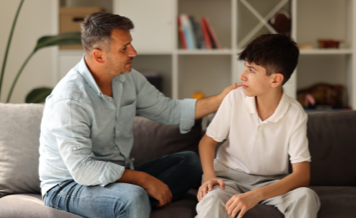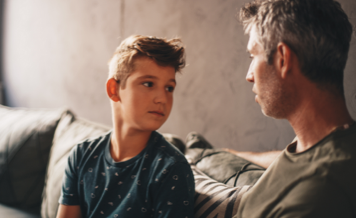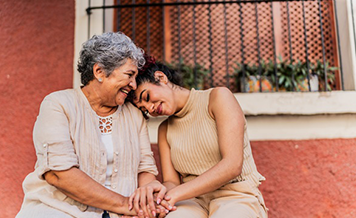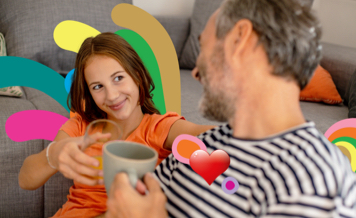Why suicide prevention matters
In 2023, there were over 3,000 deaths by suicide in Australia. Suicide is tragic and it impacts families and communities in devastating ways; teachers, coworkers, mates, neighbours, first responders and many others can all be deeply affected by the event for the rest of their lives. Many Australians experience suicidal thoughts and it’s important for you to stay safe. Suicide prevention aims to help you identify the warning signs and risk factors for suicide, and how to get help for yourself or someone else.
The most important thing you can do is to speak up so that you can get the support you need.
Jump to section: Warning signs | Lifestyle and suicide prevention | Where to get help
Look out for warning signs
According to research, 1 in 6 Australians aged between 16 – 85 experience suicidal thoughts at some point in their lives. Why? It’s complex and differs from person to person but it’s common for people with suicidal thoughts to show warning signs in the way they talk, feel or behave.
Someone with suicidal thoughts may talk about:
death
guilt
shame
the fact that they are a burden to others.
Someone with suicidal thoughts may feel:
empty
hopeless
trapped
sad
anxious
agitated
that they have unbearable emotional or physical pain.
Someone with suicidal thoughts may change their behaviour, such as:
they act out of character or different
they avoid social activities
they say goodbye or give away important personal items
they take risks
they experience mood swings
they sleep more or less than usual
- they lose interest in self-care
- they have a poor diet or experience weight loss
- they use drugs or alcohol more often.
What causes these feelings?
There is no one cause of suicidal thoughts or feelings because everyone is different.
According to Beyond Blue some common risk factors for suicidal behaviours can include:
- a history of substance abuse
- a history of mental health conditions such as depression, anxiety, Post Traumatic Stress Disorder (PTSD) or bipolar
- relationship problems
- legal or disciplinary problems
- grief following the death of someone close
- exposure to cruel or bullying behaviour
- access to harmful means such as medications and weapons
- physical illness or disability
- previous suicide attempts.
Lifestyle and suicide prevention
You may face several challenges each day that impacts your mental health, but a healthy lifestyle can help support your mindset. Research has found that lifestyle behaviour is important to suicide prevention because low exercise, excessive smoking or a poor diet can impact mental health. It’s recommended that increased knowledge about a healthy lifestyle may help to reduce the suicide risk.
Try to:
- reduce drug and alcohol use
- quit smoking
- eat a healthy diet
- exercise regularly
- get adequate sleep.
Don’t know where to start? Don’t do it all at once. Start with one lifestyle change because it could make a difference to your mood. Once you make progress, build upon your success.
How to get help
Seek immediate help if you think you or someone’s life is in danger.
Contact Lifeline on 13 11 14 for crisis support and call 000 if you believe a life is in danger.
If you are not in immediate danger, but you need help you can call Beyond Blue: 1300 224 636. Young people aged 5 – 25 can call Kids Helpline: 1800 55 1800.
Talk to your doctor or a health professional as soon as possible because they will be able to assess your situation and recommend the next steps.
Talk to someone about how you feel because it can be helpful. Choose someone that you trust and feel comfortable with whether that’s a family member, teacher, friend or other health professional. It may feel difficult but try to be honest about how you feel and be open about the help you need.
The most important thing to remember is you are not alone and that the support of others can help you on your journey to recovery.
How to get help for someone else
If you are worried about someone because they may be experiencing thoughts about suicide or displaying some of the behaviours associated with suicide risk, the most important thing you can do is to listen, show you care and offer support. Ask how someone feels and ask directly about suicide because it could be the first step to help them – don’t be afraid to have the conversation.
There are many ways to ask someone if they’re ok but make sure you listen with an open mind, encourage them to act and stay safe. Check in with them on a regular basis after the conversation to let them know you are thinking about them and make sure they take action to get help.
It can be a frightening or overwhelming conversation to have but it could change someone’s life.
If at any point you feel like someone’s life is in danger, seek immediate help. Contact Lifeline on 13 11 14 for crisis support and call 000 if you believe that someone’s life is in danger.
How can we help?
I want to know how my cover supports mental health
I need help and want to talk
Related articles
Things you need to know
While we hope you find this information helpful, please note that it is general in nature. It is not health advice, and is not tailored to meet your individual health needs. You should always consult a trusted health professional before making decisions about your health care. While we have prepared the information carefully, we can’t guarantee that it is accurate, complete or up-to-date. And while we may mention goods or services provided by others, we aren’t specifically endorsing them and can’t accept responsibility for them. For these reasons we are unable to accept responsibility for any loss that may be sustained from acting on this information (subject to applicable consumer guarantees).







